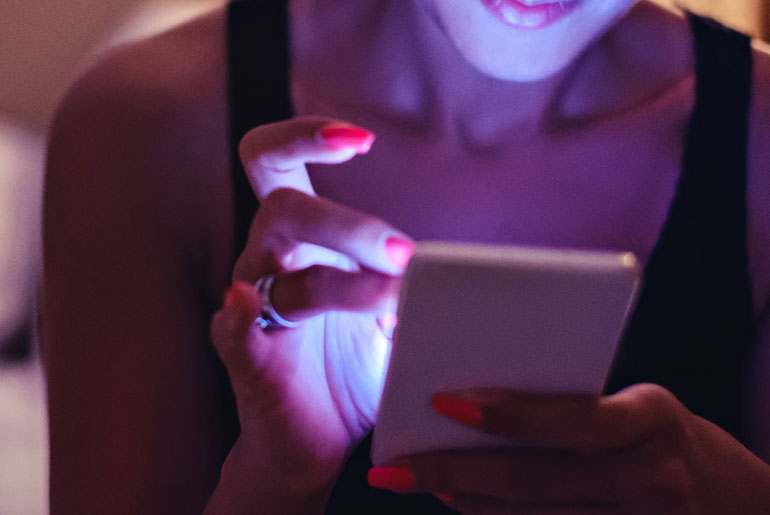In today’s digital world, the average person spends hours in front of screens, exposing themselves to blue light, a type of high-energy visible (HEV) light emitted by smartphones, computers, tablets, and televisions. While the harmful effects of UV rays on skin health are well-known, recent studies and dermatologists are raising concerns about blue light’s potential to accelerate skin ageing. Prolonged exposure to blue light has been linked to premature signs of ageing, such as wrinkles, hyperpigmentation, and loss of skin elasticity, as it penetrates deeper into the skin than UV rays, causing oxidative stress and damage to skin cells. This highlights the importance of protecting the skin not only from UV rays but also from the cumulative effects of blue light.
Understanding Blue Light and Its Sources:
Blue light, with wavelengths between 400-500 nanometers, is part of the visible light spectrum and is found in both sunlight and artificial sources like digital screens, LED lights, and fluorescent lighting. While sunlight provides a greater intensity of blue light, prolonged exposure to screens due to their proximity and usage duration has raised concerns about skin health. Unlike UV rays, blue light penetrates deeper into the skin, reaching the dermis where collagen and elastin are located. This deep penetration triggers oxidative stress, which damages skin cells and accelerates premature ageing, such as wrinkles and loss of elasticity. Additionally, blue light can worsen pigmentation issues, particularly in individuals with darker skin tones, making it a broader concern beyond just ageing.
Understanding Blue Light and Its Sources:
Blue light contributes to skin ageing primarily through oxidative stress. When exposed to blue light, the skin produces reactive oxygen species (ROS), which degrade collagen and elastin—proteins responsible for skin’s firmness and elasticity. This breakdown accelerates the appearance of fine lines, wrinkles, and sagging skin. Blue light-induced oxidative stress also weakens the skin’s natural barrier, leading to increased moisture loss and making the skin more prone to dryness, irritation, and sensitivity. Furthermore, blue light stimulates melanin production, exacerbating hyperpigmentation conditions like melasma, particularly in individuals with darker skin tones. Thus, blue light poses a multifaceted threat to skin health, accelerating ageing and worsening pigmentation issues.
Blue light contributes to skin ageing:
The modern lifestyle, dominated by prolonged screen time, has made the cumulative effect of blue light on skin health increasingly concerning. While many people underestimate the impact of non-UV light sources, dermatologists are emphasizing how everyday digital habits are accelerating skin ageing, a phenomenon now referred to as “digital ageing.” This emerging concept highlights the premature ageing of the skin due to excessive blue light exposure from screens, particularly affecting younger individuals who spend more time in front of devices. Early signs of digital ageing include fine lines around the eyes and mouth, dullness, and an uneven skin tone. As awareness grows, it is clear that screen time contributes to skin damage in ways that are only just being fully understood.
Protecting Your Skin from Blue Light Damage:
- Use Broad-Spectrum Sunscreen: Apply a broad-spectrum sunscreen that blocks both UV and HEV (high-energy visible) light. Look for ingredients like zinc oxide, titanium dioxide, or iron oxides for blue light protection.
- Incorporate Antioxidants: Utilize skincare products rich in antioxidants, such as vitamin C, vitamin E, and niacinamide. These can help neutralize free radicals generated by blue light exposure, enhancing your skin’s defense against oxidative stress.
- Limit Screen Time: Reduce the time spent in front of screens to decrease blue light exposure. Take regular breaks while using digital devices, as recommended by dermatologists.
- Use Blue Light Filters and Protective Eyewear: Enable blue light filters or “night mode” settings on your devices. Consider wearing blue light-blocking glasses to protect both your eyes and skin from prolonged exposure.
- Adopt Healthy Lifestyle Choices: Maintain a diet rich in antioxidants, stay adequately hydrated, and ensure proper sleep. These lifestyle choices contribute to overall skin health and resilience against blue light damage.
Importance of Awareness
As reliance on digital devices increases, understanding the effects of blue light on skin health becomes crucial. While blue light may not cause immediate damage like UV light, its long-term impact on skin aging is significant. By implementing these proactive strategies, you can help safeguard your skin from premature aging and adapt your skincare routine to counteract all environmental stressors, including digital damage.
Disclaimer:
The information contained in this article is for educational and informational purposes only and is not intended as a health advice. We would ask you to consult a qualified professional or medical expert to gain additional knowledge before you choose to consume any product or perform any exercise.






